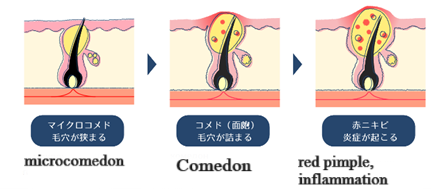What is non-comedogenic cosmetics? What should you pay attention to when choosing care products?
Have you ever heard: "If you have acne-prone skin, it is recommended to use non-comedogenic cosmetics?" What kind of cosmetics is this and how to choose it correctly?
"Non-comedogenic" means "less likely to cause acne." Comedone is an early stage of acne, meaning clogging of the pores. The early stages of acne include white and black dots that clog the pores, and when they become inflamed, they turn scarlet. Therefore, it is important to eliminate comedones in order to prevent the progression of acne.

Special cosmetics can help the skin become less prone to acne.
Acne usually occurs when sebum or oil accumulates in the pores and on the skin, causing the bacteria that cause acne to multiply. Sebum and oil, which are preferred by acne bacteria, can increase due to various external factors. For example, using cosmetics with a high oil content can promote the growth of "acne bacteria". Therefore, one of the ways to reduce greasiness and clogging of pores is to use non–comedogenic cosmetics.
Non-comedogenic cosmetics suppress the fat content that causes the growth of acne-causing bacteria and prevent clogging of pores. By regularly using non-comedogenic cosmetics, you can make your skin less prone to acne. Non-comedogenic cosmetics have no effect on acne that has already formed, but it can help significantly reduce their formation.
What exactly is referred to as non-comedogenic cosmetics?
"Non—comedogenic" is a label assigned only to products that have passed histological testing. This is a test that allows you to determine whether the probability that the product will cause comedones is extremely low. The test involves repeatedly applying a sample to a person's back, which has a relatively large number of sebaceous glands, to check if comedones occur. Products that pass this test are less likely to form comedones, and have a special label on the package "Non-comedogenic. Tested."
Are there other formulations of the same label?
Sometimes there are markings similar to "Non-comedogenic. Tested", but in reality it is not a tested product. Only the wording "Tested for non-comedogenicity"/"Non-comedogenic. Tested" — accurately indicates that a test has been conducted, during which a sample of the product is applied to check whether comedones, early stages of acne occur.
However, there are some confusing similar expressions in cosmetics, "non-comedogenic formulation", "anti-acne formulation" and "medicinal acne care". This can be written even if the product has not passed the test for non-comedogenicity. Such products usually contain fewer oils and other strong ingredients that can irritate the skin.
How to choose proven cosmetics that do not cause acne?
If you need a proven cosmetic product that does not cause acne, first check whether the package says "Non-comedogenic. Tested.
"【ノンコメドジェニックテスト済み】
In addition, you can choose products according to 3 criteria:
- Choose medical cosmetics" / with labeling
- Choose cosmetics that do not contain irritating additives
- Choose cosmetics that have a high moisturizing ability.
Products labeled "therapeutic cosmetics" contain active ingredients approved by the Ministry of Health, Labor and Social Security of Japan in a certain concentration, and they can be purchased without a doctor's prescription. It's not medicine, but it's not cosmetics either.
Pay attention to the composition: for example, the effective ingredients for the treatment of acne are as follows:
- Dicalia glycyrrhizinate: anti-inflammatory effect.
- Allantoin: anti-inflammatory effect
- Salicylic acid: a bactericidal ingredient.
- Isopropylmethylphenol: a bactericidal ingredient.
Therefore, if you want to use something other than medicines, we recommend choosing something that contains these active ingredients.
Choose cosmetics that do not contain irritating additives. Cosmetics without additives are cosmetics that do not use certain ingredients such as flavorings or preservatives, for example, the following:
- Ethanol Ethyl alcohol has an excellent ability to dissolve various ingredients.
- Paraben: A preservative to prevent microbial contamination that can cause allergic reactions.
- Synthetic flavors: Artificial flavors made from chemicals that may contain chemicals.
- Dyes are used to give color to products and can cause allergic reactions.
All these additives can irritate the skin, making it more prone to dryness. And when your skin gets dry, it releases too much sebum, trying to protect itself from dryness. Thus, choosing cosmetics without additives allows you to minimize irritation, which can contribute to the appearance of acne.
On such cosmetics it should be indicated:
- Does not contain alcohol, alcohol Indicates that ethanol is not included.
- Paraben-free Indicates that the product does not contain parabens.
- No flavors Indicates that no flavor has been added.
- No dyes Indicates that no dye is added.
Choose cosmetics with high moisturizing properties.
Using cosmetics with low moisturizing properties can increase the likelihood of drying out the skin. When your skin becomes dry, it tends to release excess sebum to protect itself from dryness, which increases the likelihood of acne.
Please use this as a guideline when choosing cosmetics if your skin is prone to acne.


